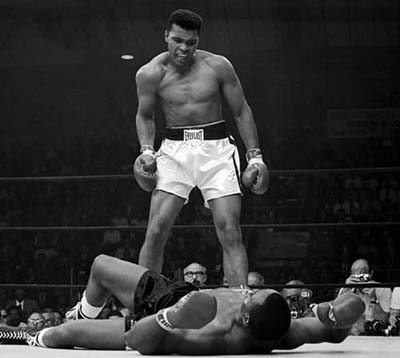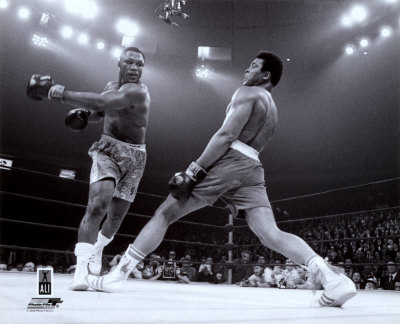|
TennisOne Lessons A Competitive Mentality David Sammel "Every battle is won before it's fought." Sun Tzu Most battles, whether in sport or business, are won or lost before the events take place. Developing a strong competitive mentality and the mind of a champion takes time and experience. It takes years of repetition and learning, years of gaining personal power through knowledge, wisdom often gained reflecting after the disappointment of losing. Each time you improve the discipline and the control of your thoughts under pressure adds to the creation of a champion’s mind. Star performers have a competitive desire for success that becomes instinctive.
Remaining in the Present The key to a winning mindset in all competition is the discipline to control excess emotion, to stay in the present and remained focused on the job. If things are going well and you let your mind drift, then focus on the present task is lost. When you are winning, it is tempting to project forward into the future, imagining all the wonderful things that will come with victory. However, victory may not be the outcome if your mind is not properly present in the match. When your mind wanders who will play for you in your absence? Clearly the answer to this question is no one. When your mind returns to the scene, it is often a vastly different place (with a different score) to the one you left. Panic sets in. This can easily lead to another mental error, which is falling into a state of regret for failing to capitalize on a winning position. In these circumstances it is easy for the mind to jump into the immediate past or into a negative future ("I’m never going to win now," or "what are the papers going to say if I lose to this guy again?").Yet, only moments earlier the situation seemed so rosy If you slip into the past and think of all the opportunities you blew in this and past matches, you are not fully present in the current match. You cannot play properly when mentally you are not fully there. Repeatedly players invite the same result again and again because they cannot discipline their mind to remain in the present. When you slip into the past or project yourself into the future you will attach the emotions of that time to your actions of the present. The baggage of these emotions is detrimental to achieving peak performance in the present. Each present situation has no link to the past unless you create the link. The horror of the past will not be repeated if you take different actions in the present. Remember, the glory of the future cannot happen without the work done in the present.
Unsettling Your Opponent Another key to being a brilliant competitor and champion is to understand that you often need to unsettle your opponent’s mind rather than try to defeat his game. Champions read people well; they constantly monitor their opponents’ reactions and moods to find a way of using pressure to erodes their confidence. There is a strong element of poker in sport. One of the finest examples of this was the wonderful Rumble in the Jungle where Muhammad Ali who was past his best, fought George Foreman, a boxer in his prime and full of confidence. George was the better boxer at that particular point in their careers and was hot favorite to destroy Ali. However, Ali had other ideas – a plan that attacked Foreman’s mind and a strategy that turned the fight into a personal contest rather than a pure boxing match. The rope-a-dope tactic employed by Ali (He shielded his face with his gloves and leaned back on the ropes allowing Foreman to hit him repeatedly) worked because it was unexpected (Ali had always prided himself on his speed). Ali talked non-stop during the fight taunting Foreman into a fury by constantly asking him after each hammer blow that Foreman landed: "Is that all you got? I thought they said you had the hardest punch ever. Is that your best?" Foreman’s anger and desire to show his superior power to hurt Ali clouded his judgment and his ability to listen to his corner.
As he set about beating Ali, showing him how powerful his punches were, how badly he could beat him and how he would shut him up, he proceeded to punch himself into exhaustion. At this point Ali attacked and knocked him out! Ali had found the key to beating the person, not the boxer. The contest was not about boxing; it was about one man unsettling another’s mental equilibrium. It is important to understand that for this tactic to work Ali had to know himself well and have total faith in himself. He had to have the conviction that he was brave and strong enough to take the punishment, a sustained beating, without losing his discipline or his clarity of mind during the painful seven or more rounds it would take for George to tire. Power of Imagination The power of imagination cannot be underestimated. What we think about and picture in our minds has a huge affect on how we perform and on the outcome of a sporting encounter. The ability to convert negatives into concepts that work powerfully to our advantage is epitomized in the quote by Michael Jordan where he transforms his interpretation of fear. The various pitfalls sportsmen can fall into that prevent them from competing effectively are numerous. When athletes are nervous and afraid of an upcoming contest they can slip into a negative mindset, thinking of all the things that might go wrong and the consequences of losing. Imagining a poor outcome, sometimes as a way to prepare for the disappointment they will feel if they have to deal with a loss often becomes a self-fulfilling prophecy. The self-protection of a having visualized possible defeat becomes a comfortable friend, but is in fact a powerful enemy of performance and success. It is difficult to win when imagining failure. Simply having a "hope" of winning can quickly evaporate, especially if the start is poor. Athletes often hope and want to believe they can win, but at the first sign of trouble their minds drift very quickly into justifying defeat. Intimidation Intimidation is another reasons athletes lose, sometimes long before the match begins. The mere presence of their opponents, the way they walk or talk, their confidence and other people’s opinions of them, can cause the mind to slip into thoughts of defeat. The ironic aspect of this phenomenon is that often the opponents are faking confidence and are, in fact, terrified themselves. Often the intimidating nature of our opponents is only a perception and it never occurs to players and teams that the opponents might actually be fearful of them. I have witnessed countless events where the winners are as surprised as anyone to have won. If two opponents are equally fearful of each other, it is often the player or team that encounters good form or fortune early in the game that gain the confidence to walk off with a victory. The False Deciding Moment Another powerful enemy of the competitor is the notion that a battle is won or lost through one key moment during a contest. It is simply too easy to say "just a little luck at a key moment decided it." While this cliché can be true, and we can admire the frankness and realism of a reasonably brave competitor who only accepts defeat when a key moment goes against him, it is the champion who fights this particular enemy of excellence and works to create another decisive moment.
A winner will only concede defeat and stop trying to find an answer when the contest is over. In other words, a winner is not someone who never loses; it is someone who competes until the game is over. Naturally, for you to be considered a winner, you must have a measure of tangible success. But being a winner should by no means be confused with never losing. Champions, since they too are human, cannot always be mentally tough and sometimes lose through a poor mental performance. However, with champions these lapses are rare. Generally they have few preconceptions and rarely does one key moment dent their resolve to fight and hang in until the end. The hardest part of defeating true champions is finishing them off. This is because they are always looking for an opportunity to get back into a match and remain truly competitive until the contest is over. In fact, champions can be most dangerous when their chances of winning are remote. They relax, accept the reality of the situation, and just go for it with a controlled yet high risk strategy. This daring competitiveness is often a turning point in itself because it is disconcerting and difficult to stop a high risk strategy if it starts to work. Developing a Champion's Competitive Spirits So, how do you achieve the power to deliver consistent performance in competitive situations and strike, if not fear into an opponent’s mind and heart, then at least uneasiness or respect for the impending battle? In answer to this question, you have to decide that you want to be an effective competitor. Following this decision you then start a journey of exploration into yourself through reading, playing and learning. From all these experiences you find and create personal methods and rituals that work for you under pressure. I reiterate that you can learn from many books, articles, coaches and champions but the key is being able to personalize your competitive nature. One fact is certain – anyone with a desire to strengthen their mind can do so. To develop a competitive mind:
|



